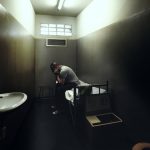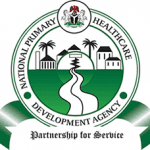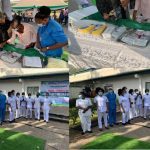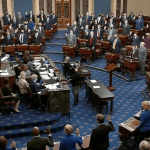Lagos State Government has launched a mental health helpline tagged ‘The Lagos Lifeline’.
The helpline, which is a tele-Mental Health service that provides Lagos residents with access to psychosocial support, counselling and psychotherapy services free of charge through a dedicated line – 0909000MIND or 09090006463.
Speaking at the formal launch of the facility, the Commissioner for Health, Prof. Akin Abayomi said the Lagos Lifeline is a Mental Health Crisis Management service designed to bridge the gap in the availability of mental health service.
“The Lagos Lifeline provides a bridge to meet various challenges militating against access to mental health services including, the incidence of suicidal attempts, poor access to mental health services for patients in hard-to-reach areas, Stigma to Mental Health Issues and patients who need treatment, poor access to information and referral to neighboring health facilities providing mental health services and poor linkages for mental health support for victims of Domestic and Sexual Violence”, Abayomi stated.
He noted that the objective of the Lagos Lifeline is geared towards providing improved access to simple diagnostic, counselling, and referral services for Lagosians, either as first point-of-call, or for follow-up care.
While stating that the Governor of Lagos State, Mr. Babajide Sanwo-Olu has made mental health a priority, the Commissioner averred that this is evident in government’s implementation activities targeted at increasing access to mental health care at primary, secondary and tertiary levels of health infrastructure.
Abayomi disclosed that the State Government has conceptualized a Mental Health Institute with a capacity for 500 bed psychiatric hospital and 1000 bed rehabilitation Centre at Ketu Ejirin in furtherance of its efforts to improve access to mental health services.
He said: “To make sure that we pick up mental health early, we are refurbishing our psychiatric wards in our general hospitals and in our tertiary hospital at LASUTH, and going beyond that, we have currently designed and conceptualized probably the largest mental health institute in Nigeria; it will be 500 bed psychiatric hospital coupled with 1000 bed for rehabilitation.
“It was originally scheduled to be built in Majidun but it will be too big for Majidun, so we had to move it to Ketu-Ejirin where we have a lot of space. It is going to be on 15 hectares of land, we are currently reclaiming the lands.
We have appointed the contractors, work will start this year and it will become the focal point of our mental health strategy where we will provide Lagosians with access to mental health services and train persons who are skilled in recognizing and treating mental health”.
The Commissioner hinted that the state government will expend resources to address mental health issues particularly as it affects emerging issues of stress, anxiety, stigmatization and mental health disorders associated with a mega city like Lagos.
While noting that mental health is one of the disciplines in health that has been neglected, Abayomi averred that the present administration is trying to make up for the neglect by investing in infrastructure and human resource development to manage and address mental health issues.
“So while we plan to commemorate this year’s Mental Health Awareness Month in May, we will keep going with a lot of energy. We will ensure that we develop the human resources that are able to manage mental disorders, more importantly create the opportunity to detect tell-tale science very early and treat them before they become serious problems, and at the end, just making life easier for Lagosians will go a long way to easing mental disorder, mental stress and mental anxiety”, he said.
Earlier, the Permanent Secretary, Ministry of Health, Dr. Olusegun Ogboye said the COVID19 pandemic and its ensuing response including the lockdown strategy brought to fore some health issues that are linked to mental health prompting the need for improved access to mental health services
He said: “The Ministry of Health recognized early that there is a reason to strengthen our mental health program and our mental health response and this is what led to the setup of the Lagos Lifeline. We have a team of dedicated staff led by Dr Ajumale who has been extremely committed to this process to help set up the help line”.
Explaining how the Lifeline works, Ogboye said “we have people who have been trained in responding to callers. People call in and speak with one of our trained Lifeline counselors who find out what the challenges are and provide help as required.
“Sometimes the Lifeline contact ends with that single conversation and sometimes it requires further engagement. The Lifeline counselors are volunteers and they sometimes reach back to people or take calls back again from people. There is a back and front that resolves issues and sometimes we refer specific mental health issues to mental professionals for further engagement and management”.
The Permanent Secretary stated that the Lifeline is a 24hours service that has linkage to a much bigger program and services for mental health in Lagos state.
Also speaking, the Head Special Projects and State Mental Health Desk Officer, Dr. Tolu Ajomale explained that the goals of the Lifeline are to: provide Psychological First Aid and Social Support service, alleviate the strain on existing public health resources by creating a coordination point to refer patients for appropriate care and serve as a Mental Health campaign Feedback system.
Other goals according to him are to: create valuable data points that can be used to track prevalence and cycle of care for Mental Health in Lagos State, access to mental health services for patients in hard-to-reach areas, improve linkages for victims of Domestic and Sexual Violence and Suicidal Threats and Emergency Medical Services.
“The Lifeline will also provide the opportunity to improve training and access to skill development in Mental Health for Staff, Volunteers, and Interns; create a partnership Hub for Multinationals, Corporate Organizations and NGOs with interests in Mental Health; evaluate the acceptance of Telehealth in wider Healthcare Space and serve as an advocacy Hub to improve uptake of State health programs including Health Insurance and information dissemination during epidemics.
“The service will be running 24hrs, it has multiple access points, you can also book appointments via email to speak with a counselor and we also have good networks with private providers as well.
“We have different kinds of calls that will be coming in over the couple of weeks because we have been testing the service; we have people with mood disorder, suicidal ideations, substance abuse. Parents have called on behalf of their children as well to ask and speak about some of these issues and to seek help regarding them. So we are much honoured to launch this service and to increase the scope of its delivery”, Ajomale said.
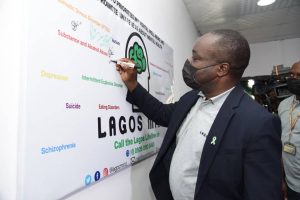
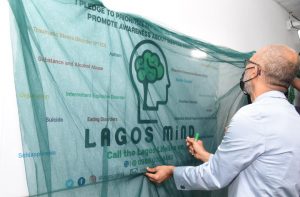
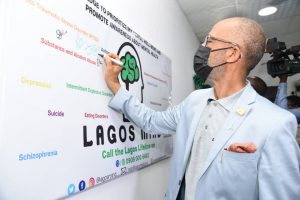
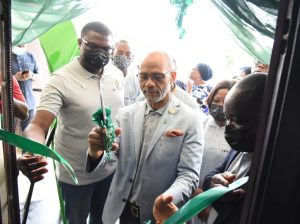
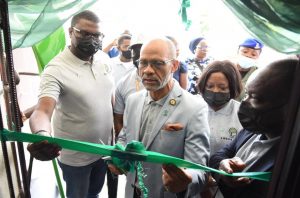
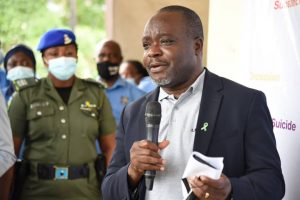
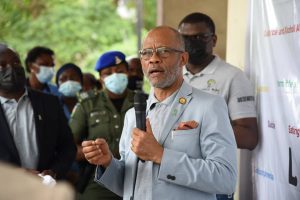
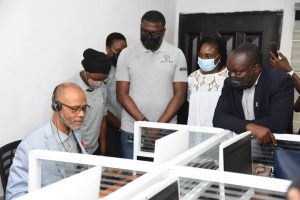
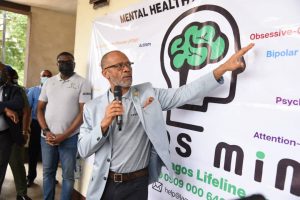
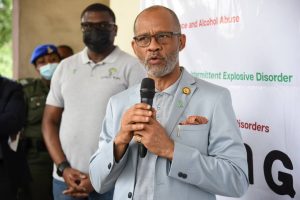
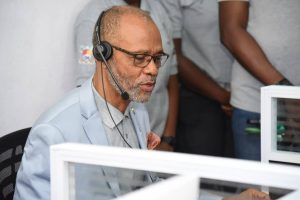
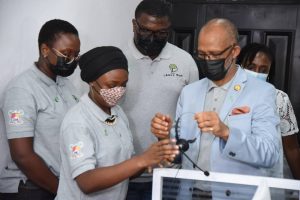
Lagos State Government has launched a mental health helpline tagged ‘The Lagos Lifeline’.
The helpline, which is a tele-Mental Health service that provides Lagos residents with access to psychosocial support, counselling and psychotherapy services free of charge through a dedicated line – 0909000MIND or 09090006463.
Speaking at the formal launch of the facility, the Commissioner for Health, Prof. Akin Abayomi said the Lagos Lifeline is a Mental Health Crisis Management service designed to bridge the gap in the availability of mental health service.
“The Lagos Lifeline provides a bridge to meet various challenges militating against access to mental health services including, the incidence of suicidal attempts, poor access to mental health services for patients in hard-to-reach areas, Stigma to Mental Health Issues and patients who need treatment, poor access to information and referral to neighboring health facilities providing mental health services and poor linkages for mental health support for victims of Domestic and Sexual Violence”, Abayomi stated.
He noted that the objective of the Lagos Lifeline is geared towards providing improved access to simple diagnostic, counselling, and referral services for Lagosians, either as first point-of-call, or for follow-up care.
While stating that the Governor of Lagos State, Mr. Babajide Sanwo-Olu has made mental health a priority, the Commissioner averred that this is evident in government’s implementation activities targeted at increasing access to mental health care at primary, secondary and tertiary levels of health infrastructure.
Abayomi disclosed that the State Government has conceptualized a Mental Health Institute with a capacity for 500 bed psychiatric hospital and 1000 bed rehabilitation Centre at Ketu Ejirin in furtherance of its efforts to improve access to mental health services.
He said: “To make sure that we pick up mental health early, we are refurbishing our psychiatric wards in our general hospitals and in our tertiary hospital at LASUTH, and going beyond that, we have currently designed and conceptualized probably the largest mental health institute in Nigeria; it will be 500 bed psychiatric hospital coupled with 1000 bed for rehabilitation.
“It was originally scheduled to be built in Majidun but it will be too big for Majidun, so we had to move it to Ketu-Ejirin where we have a lot of space. It is going to be on 15 hectares of land, we are currently reclaiming the lands.
We have appointed the contractors, work will start this year and it will become the focal point of our mental health strategy where we will provide Lagosians with access to mental health services and train persons who are skilled in recognizing and treating mental health”.
The Commissioner hinted that the state government will expend resources to address mental health issues particularly as it affects emerging issues of stress, anxiety, stigmatization and mental health disorders associated with a mega city like Lagos.
While noting that mental health is one of the disciplines in health that has been neglected, Abayomi averred that the present administration is trying to make up for the neglect by investing in infrastructure and human resource development to manage and address mental health issues.
“So while we plan to commemorate this year’s Mental Health Awareness Month in May, we will keep going with a lot of energy. We will ensure that we develop the human resources that are able to manage mental disorders, more importantly create the opportunity to detect tell-tale science very early and treat them before they become serious problems, and at the end, just making life easier for Lagosians will go a long way to easing mental disorder, mental stress and mental anxiety”, he said.
Earlier, the Permanent Secretary, Ministry of Health, Dr. Olusegun Ogboye said the COVID19 pandemic and its ensuing response including the lockdown strategy brought to fore some health issues that are linked to mental health prompting the need for improved access to mental health services
He said: “The Ministry of Health recognized early that there is a reason to strengthen our mental health program and our mental health response and this is what led to the setup of the Lagos Lifeline. We have a team of dedicated staff led by Dr Ajumale who has been extremely committed to this process to help set up the help line”.
Explaining how the Lifeline works, Ogboye said “we have people who have been trained in responding to callers. People call in and speak with one of our trained Lifeline counselors who find out what the challenges are and provide help as required.
“Sometimes the Lifeline contact ends with that single conversation and sometimes it requires further engagement. The Lifeline counselors are volunteers and they sometimes reach back to people or take calls back again from people. There is a back and front that resolves issues and sometimes we refer specific mental health issues to mental professionals for further engagement and management”.
The Permanent Secretary stated that the Lifeline is a 24hours service that has linkage to a much bigger program and services for mental health in Lagos state.
Also speaking, the Head Special Projects and State Mental Health Desk Officer, Dr. Tolu Ajomale explained that the goals of the Lifeline are to: provide Psychological First Aid and Social Support service, alleviate the strain on existing public health resources by creating a coordination point to refer patients for appropriate care and serve as a Mental Health campaign Feedback system.
Other goals according to him are to: create valuable data points that can be used to track prevalence and cycle of care for Mental Health in Lagos State, access to mental health services for patients in hard-to-reach areas, improve linkages for victims of Domestic and Sexual Violence and Suicidal Threats and Emergency Medical Services.
“The Lifeline will also provide the opportunity to improve training and access to skill development in Mental Health for Staff, Volunteers, and Interns; create a partnership Hub for Multinationals, Corporate Organizations and NGOs with interests in Mental Health; evaluate the acceptance of Telehealth in wider Healthcare Space and serve as an advocacy Hub to improve uptake of State health programs including Health Insurance and information dissemination during epidemics.
“The service will be running 24hrs, it has multiple access points, you can also book appointments via email to speak with a counselor and we also have good networks with private providers as well.
“We have different kinds of calls that will be coming in over the couple of weeks because we have been testing the service; we have people with mood disorder, suicidal ideations, substance abuse. Parents have called on behalf of their children as well to ask and speak about some of these issues and to seek help regarding them. So we are much honoured to launch this service and to increase the scope of its delivery”, Ajomale said.












Lagos State Government has launched a mental health helpline tagged ‘The Lagos Lifeline’.
The helpline, which is a tele-Mental Health service that provides Lagos residents with access to psychosocial support, counselling and psychotherapy services free of charge through a dedicated line – 0909000MIND or 09090006463.
Speaking at the formal launch of the facility, the Commissioner for Health, Prof. Akin Abayomi said the Lagos Lifeline is a Mental Health Crisis Management service designed to bridge the gap in the availability of mental health service.
“The Lagos Lifeline provides a bridge to meet various challenges militating against access to mental health services including, the incidence of suicidal attempts, poor access to mental health services for patients in hard-to-reach areas, Stigma to Mental Health Issues and patients who need treatment, poor access to information and referral to neighboring health facilities providing mental health services and poor linkages for mental health support for victims of Domestic and Sexual Violence”, Abayomi stated.
He noted that the objective of the Lagos Lifeline is geared towards providing improved access to simple diagnostic, counselling, and referral services for Lagosians, either as first point-of-call, or for follow-up care.
While stating that the Governor of Lagos State, Mr. Babajide Sanwo-Olu has made mental health a priority, the Commissioner averred that this is evident in government’s implementation activities targeted at increasing access to mental health care at primary, secondary and tertiary levels of health infrastructure.
Abayomi disclosed that the State Government has conceptualized a Mental Health Institute with a capacity for 500 bed psychiatric hospital and 1000 bed rehabilitation Centre at Ketu Ejirin in furtherance of its efforts to improve access to mental health services.
He said: “To make sure that we pick up mental health early, we are refurbishing our psychiatric wards in our general hospitals and in our tertiary hospital at LASUTH, and going beyond that, we have currently designed and conceptualized probably the largest mental health institute in Nigeria; it will be 500 bed psychiatric hospital coupled with 1000 bed for rehabilitation.
“It was originally scheduled to be built in Majidun but it will be too big for Majidun, so we had to move it to Ketu-Ejirin where we have a lot of space. It is going to be on 15 hectares of land, we are currently reclaiming the lands.
We have appointed the contractors, work will start this year and it will become the focal point of our mental health strategy where we will provide Lagosians with access to mental health services and train persons who are skilled in recognizing and treating mental health”.
The Commissioner hinted that the state government will expend resources to address mental health issues particularly as it affects emerging issues of stress, anxiety, stigmatization and mental health disorders associated with a mega city like Lagos.
While noting that mental health is one of the disciplines in health that has been neglected, Abayomi averred that the present administration is trying to make up for the neglect by investing in infrastructure and human resource development to manage and address mental health issues.
“So while we plan to commemorate this year’s Mental Health Awareness Month in May, we will keep going with a lot of energy. We will ensure that we develop the human resources that are able to manage mental disorders, more importantly create the opportunity to detect tell-tale science very early and treat them before they become serious problems, and at the end, just making life easier for Lagosians will go a long way to easing mental disorder, mental stress and mental anxiety”, he said.
Earlier, the Permanent Secretary, Ministry of Health, Dr. Olusegun Ogboye said the COVID19 pandemic and its ensuing response including the lockdown strategy brought to fore some health issues that are linked to mental health prompting the need for improved access to mental health services
He said: “The Ministry of Health recognized early that there is a reason to strengthen our mental health program and our mental health response and this is what led to the setup of the Lagos Lifeline. We have a team of dedicated staff led by Dr Ajumale who has been extremely committed to this process to help set up the help line”.
Explaining how the Lifeline works, Ogboye said “we have people who have been trained in responding to callers. People call in and speak with one of our trained Lifeline counselors who find out what the challenges are and provide help as required.
“Sometimes the Lifeline contact ends with that single conversation and sometimes it requires further engagement. The Lifeline counselors are volunteers and they sometimes reach back to people or take calls back again from people. There is a back and front that resolves issues and sometimes we refer specific mental health issues to mental professionals for further engagement and management”.
The Permanent Secretary stated that the Lifeline is a 24hours service that has linkage to a much bigger program and services for mental health in Lagos state.
Also speaking, the Head Special Projects and State Mental Health Desk Officer, Dr. Tolu Ajomale explained that the goals of the Lifeline are to: provide Psychological First Aid and Social Support service, alleviate the strain on existing public health resources by creating a coordination point to refer patients for appropriate care and serve as a Mental Health campaign Feedback system.
Other goals according to him are to: create valuable data points that can be used to track prevalence and cycle of care for Mental Health in Lagos State, access to mental health services for patients in hard-to-reach areas, improve linkages for victims of Domestic and Sexual Violence and Suicidal Threats and Emergency Medical Services.
“The Lifeline will also provide the opportunity to improve training and access to skill development in Mental Health for Staff, Volunteers, and Interns; create a partnership Hub for Multinationals, Corporate Organizations and NGOs with interests in Mental Health; evaluate the acceptance of Telehealth in wider Healthcare Space and serve as an advocacy Hub to improve uptake of State health programs including Health Insurance and information dissemination during epidemics.
“The service will be running 24hrs, it has multiple access points, you can also book appointments via email to speak with a counselor and we also have good networks with private providers as well.
“We have different kinds of calls that will be coming in over the couple of weeks because we have been testing the service; we have people with mood disorder, suicidal ideations, substance abuse. Parents have called on behalf of their children as well to ask and speak about some of these issues and to seek help regarding them. So we are much honoured to launch this service and to increase the scope of its delivery”, Ajomale said.












Lagos State Government has launched a mental health helpline tagged ‘The Lagos Lifeline’.
The helpline, which is a tele-Mental Health service that provides Lagos residents with access to psychosocial support, counselling and psychotherapy services free of charge through a dedicated line – 0909000MIND or 09090006463.
Speaking at the formal launch of the facility, the Commissioner for Health, Prof. Akin Abayomi said the Lagos Lifeline is a Mental Health Crisis Management service designed to bridge the gap in the availability of mental health service.
“The Lagos Lifeline provides a bridge to meet various challenges militating against access to mental health services including, the incidence of suicidal attempts, poor access to mental health services for patients in hard-to-reach areas, Stigma to Mental Health Issues and patients who need treatment, poor access to information and referral to neighboring health facilities providing mental health services and poor linkages for mental health support for victims of Domestic and Sexual Violence”, Abayomi stated.
He noted that the objective of the Lagos Lifeline is geared towards providing improved access to simple diagnostic, counselling, and referral services for Lagosians, either as first point-of-call, or for follow-up care.
While stating that the Governor of Lagos State, Mr. Babajide Sanwo-Olu has made mental health a priority, the Commissioner averred that this is evident in government’s implementation activities targeted at increasing access to mental health care at primary, secondary and tertiary levels of health infrastructure.
Abayomi disclosed that the State Government has conceptualized a Mental Health Institute with a capacity for 500 bed psychiatric hospital and 1000 bed rehabilitation Centre at Ketu Ejirin in furtherance of its efforts to improve access to mental health services.
He said: “To make sure that we pick up mental health early, we are refurbishing our psychiatric wards in our general hospitals and in our tertiary hospital at LASUTH, and going beyond that, we have currently designed and conceptualized probably the largest mental health institute in Nigeria; it will be 500 bed psychiatric hospital coupled with 1000 bed for rehabilitation.
“It was originally scheduled to be built in Majidun but it will be too big for Majidun, so we had to move it to Ketu-Ejirin where we have a lot of space. It is going to be on 15 hectares of land, we are currently reclaiming the lands.
We have appointed the contractors, work will start this year and it will become the focal point of our mental health strategy where we will provide Lagosians with access to mental health services and train persons who are skilled in recognizing and treating mental health”.
The Commissioner hinted that the state government will expend resources to address mental health issues particularly as it affects emerging issues of stress, anxiety, stigmatization and mental health disorders associated with a mega city like Lagos.
While noting that mental health is one of the disciplines in health that has been neglected, Abayomi averred that the present administration is trying to make up for the neglect by investing in infrastructure and human resource development to manage and address mental health issues.
“So while we plan to commemorate this year’s Mental Health Awareness Month in May, we will keep going with a lot of energy. We will ensure that we develop the human resources that are able to manage mental disorders, more importantly create the opportunity to detect tell-tale science very early and treat them before they become serious problems, and at the end, just making life easier for Lagosians will go a long way to easing mental disorder, mental stress and mental anxiety”, he said.
Earlier, the Permanent Secretary, Ministry of Health, Dr. Olusegun Ogboye said the COVID19 pandemic and its ensuing response including the lockdown strategy brought to fore some health issues that are linked to mental health prompting the need for improved access to mental health services
He said: “The Ministry of Health recognized early that there is a reason to strengthen our mental health program and our mental health response and this is what led to the setup of the Lagos Lifeline. We have a team of dedicated staff led by Dr Ajumale who has been extremely committed to this process to help set up the help line”.
Explaining how the Lifeline works, Ogboye said “we have people who have been trained in responding to callers. People call in and speak with one of our trained Lifeline counselors who find out what the challenges are and provide help as required.
“Sometimes the Lifeline contact ends with that single conversation and sometimes it requires further engagement. The Lifeline counselors are volunteers and they sometimes reach back to people or take calls back again from people. There is a back and front that resolves issues and sometimes we refer specific mental health issues to mental professionals for further engagement and management”.
The Permanent Secretary stated that the Lifeline is a 24hours service that has linkage to a much bigger program and services for mental health in Lagos state.
Also speaking, the Head Special Projects and State Mental Health Desk Officer, Dr. Tolu Ajomale explained that the goals of the Lifeline are to: provide Psychological First Aid and Social Support service, alleviate the strain on existing public health resources by creating a coordination point to refer patients for appropriate care and serve as a Mental Health campaign Feedback system.
Other goals according to him are to: create valuable data points that can be used to track prevalence and cycle of care for Mental Health in Lagos State, access to mental health services for patients in hard-to-reach areas, improve linkages for victims of Domestic and Sexual Violence and Suicidal Threats and Emergency Medical Services.
“The Lifeline will also provide the opportunity to improve training and access to skill development in Mental Health for Staff, Volunteers, and Interns; create a partnership Hub for Multinationals, Corporate Organizations and NGOs with interests in Mental Health; evaluate the acceptance of Telehealth in wider Healthcare Space and serve as an advocacy Hub to improve uptake of State health programs including Health Insurance and information dissemination during epidemics.
“The service will be running 24hrs, it has multiple access points, you can also book appointments via email to speak with a counselor and we also have good networks with private providers as well.
“We have different kinds of calls that will be coming in over the couple of weeks because we have been testing the service; we have people with mood disorder, suicidal ideations, substance abuse. Parents have called on behalf of their children as well to ask and speak about some of these issues and to seek help regarding them. So we are much honoured to launch this service and to increase the scope of its delivery”, Ajomale said.












Lagos State Government has launched a mental health helpline tagged ‘The Lagos Lifeline’.
The helpline, which is a tele-Mental Health service that provides Lagos residents with access to psychosocial support, counselling and psychotherapy services free of charge through a dedicated line – 0909000MIND or 09090006463.
Speaking at the formal launch of the facility, the Commissioner for Health, Prof. Akin Abayomi said the Lagos Lifeline is a Mental Health Crisis Management service designed to bridge the gap in the availability of mental health service.
“The Lagos Lifeline provides a bridge to meet various challenges militating against access to mental health services including, the incidence of suicidal attempts, poor access to mental health services for patients in hard-to-reach areas, Stigma to Mental Health Issues and patients who need treatment, poor access to information and referral to neighboring health facilities providing mental health services and poor linkages for mental health support for victims of Domestic and Sexual Violence”, Abayomi stated.
He noted that the objective of the Lagos Lifeline is geared towards providing improved access to simple diagnostic, counselling, and referral services for Lagosians, either as first point-of-call, or for follow-up care.
While stating that the Governor of Lagos State, Mr. Babajide Sanwo-Olu has made mental health a priority, the Commissioner averred that this is evident in government’s implementation activities targeted at increasing access to mental health care at primary, secondary and tertiary levels of health infrastructure.
Abayomi disclosed that the State Government has conceptualized a Mental Health Institute with a capacity for 500 bed psychiatric hospital and 1000 bed rehabilitation Centre at Ketu Ejirin in furtherance of its efforts to improve access to mental health services.
He said: “To make sure that we pick up mental health early, we are refurbishing our psychiatric wards in our general hospitals and in our tertiary hospital at LASUTH, and going beyond that, we have currently designed and conceptualized probably the largest mental health institute in Nigeria; it will be 500 bed psychiatric hospital coupled with 1000 bed for rehabilitation.
“It was originally scheduled to be built in Majidun but it will be too big for Majidun, so we had to move it to Ketu-Ejirin where we have a lot of space. It is going to be on 15 hectares of land, we are currently reclaiming the lands.
We have appointed the contractors, work will start this year and it will become the focal point of our mental health strategy where we will provide Lagosians with access to mental health services and train persons who are skilled in recognizing and treating mental health”.
The Commissioner hinted that the state government will expend resources to address mental health issues particularly as it affects emerging issues of stress, anxiety, stigmatization and mental health disorders associated with a mega city like Lagos.
While noting that mental health is one of the disciplines in health that has been neglected, Abayomi averred that the present administration is trying to make up for the neglect by investing in infrastructure and human resource development to manage and address mental health issues.
“So while we plan to commemorate this year’s Mental Health Awareness Month in May, we will keep going with a lot of energy. We will ensure that we develop the human resources that are able to manage mental disorders, more importantly create the opportunity to detect tell-tale science very early and treat them before they become serious problems, and at the end, just making life easier for Lagosians will go a long way to easing mental disorder, mental stress and mental anxiety”, he said.
Earlier, the Permanent Secretary, Ministry of Health, Dr. Olusegun Ogboye said the COVID19 pandemic and its ensuing response including the lockdown strategy brought to fore some health issues that are linked to mental health prompting the need for improved access to mental health services
He said: “The Ministry of Health recognized early that there is a reason to strengthen our mental health program and our mental health response and this is what led to the setup of the Lagos Lifeline. We have a team of dedicated staff led by Dr Ajumale who has been extremely committed to this process to help set up the help line”.
Explaining how the Lifeline works, Ogboye said “we have people who have been trained in responding to callers. People call in and speak with one of our trained Lifeline counselors who find out what the challenges are and provide help as required.
“Sometimes the Lifeline contact ends with that single conversation and sometimes it requires further engagement. The Lifeline counselors are volunteers and they sometimes reach back to people or take calls back again from people. There is a back and front that resolves issues and sometimes we refer specific mental health issues to mental professionals for further engagement and management”.
The Permanent Secretary stated that the Lifeline is a 24hours service that has linkage to a much bigger program and services for mental health in Lagos state.
Also speaking, the Head Special Projects and State Mental Health Desk Officer, Dr. Tolu Ajomale explained that the goals of the Lifeline are to: provide Psychological First Aid and Social Support service, alleviate the strain on existing public health resources by creating a coordination point to refer patients for appropriate care and serve as a Mental Health campaign Feedback system.
Other goals according to him are to: create valuable data points that can be used to track prevalence and cycle of care for Mental Health in Lagos State, access to mental health services for patients in hard-to-reach areas, improve linkages for victims of Domestic and Sexual Violence and Suicidal Threats and Emergency Medical Services.
“The Lifeline will also provide the opportunity to improve training and access to skill development in Mental Health for Staff, Volunteers, and Interns; create a partnership Hub for Multinationals, Corporate Organizations and NGOs with interests in Mental Health; evaluate the acceptance of Telehealth in wider Healthcare Space and serve as an advocacy Hub to improve uptake of State health programs including Health Insurance and information dissemination during epidemics.
“The service will be running 24hrs, it has multiple access points, you can also book appointments via email to speak with a counselor and we also have good networks with private providers as well.
“We have different kinds of calls that will be coming in over the couple of weeks because we have been testing the service; we have people with mood disorder, suicidal ideations, substance abuse. Parents have called on behalf of their children as well to ask and speak about some of these issues and to seek help regarding them. So we are much honoured to launch this service and to increase the scope of its delivery”, Ajomale said.












Lagos State Government has launched a mental health helpline tagged ‘The Lagos Lifeline’.
The helpline, which is a tele-Mental Health service that provides Lagos residents with access to psychosocial support, counselling and psychotherapy services free of charge through a dedicated line – 0909000MIND or 09090006463.
Speaking at the formal launch of the facility, the Commissioner for Health, Prof. Akin Abayomi said the Lagos Lifeline is a Mental Health Crisis Management service designed to bridge the gap in the availability of mental health service.
“The Lagos Lifeline provides a bridge to meet various challenges militating against access to mental health services including, the incidence of suicidal attempts, poor access to mental health services for patients in hard-to-reach areas, Stigma to Mental Health Issues and patients who need treatment, poor access to information and referral to neighboring health facilities providing mental health services and poor linkages for mental health support for victims of Domestic and Sexual Violence”, Abayomi stated.
He noted that the objective of the Lagos Lifeline is geared towards providing improved access to simple diagnostic, counselling, and referral services for Lagosians, either as first point-of-call, or for follow-up care.
While stating that the Governor of Lagos State, Mr. Babajide Sanwo-Olu has made mental health a priority, the Commissioner averred that this is evident in government’s implementation activities targeted at increasing access to mental health care at primary, secondary and tertiary levels of health infrastructure.
Abayomi disclosed that the State Government has conceptualized a Mental Health Institute with a capacity for 500 bed psychiatric hospital and 1000 bed rehabilitation Centre at Ketu Ejirin in furtherance of its efforts to improve access to mental health services.
He said: “To make sure that we pick up mental health early, we are refurbishing our psychiatric wards in our general hospitals and in our tertiary hospital at LASUTH, and going beyond that, we have currently designed and conceptualized probably the largest mental health institute in Nigeria; it will be 500 bed psychiatric hospital coupled with 1000 bed for rehabilitation.
“It was originally scheduled to be built in Majidun but it will be too big for Majidun, so we had to move it to Ketu-Ejirin where we have a lot of space. It is going to be on 15 hectares of land, we are currently reclaiming the lands.
We have appointed the contractors, work will start this year and it will become the focal point of our mental health strategy where we will provide Lagosians with access to mental health services and train persons who are skilled in recognizing and treating mental health”.
The Commissioner hinted that the state government will expend resources to address mental health issues particularly as it affects emerging issues of stress, anxiety, stigmatization and mental health disorders associated with a mega city like Lagos.
While noting that mental health is one of the disciplines in health that has been neglected, Abayomi averred that the present administration is trying to make up for the neglect by investing in infrastructure and human resource development to manage and address mental health issues.
“So while we plan to commemorate this year’s Mental Health Awareness Month in May, we will keep going with a lot of energy. We will ensure that we develop the human resources that are able to manage mental disorders, more importantly create the opportunity to detect tell-tale science very early and treat them before they become serious problems, and at the end, just making life easier for Lagosians will go a long way to easing mental disorder, mental stress and mental anxiety”, he said.
Earlier, the Permanent Secretary, Ministry of Health, Dr. Olusegun Ogboye said the COVID19 pandemic and its ensuing response including the lockdown strategy brought to fore some health issues that are linked to mental health prompting the need for improved access to mental health services
He said: “The Ministry of Health recognized early that there is a reason to strengthen our mental health program and our mental health response and this is what led to the setup of the Lagos Lifeline. We have a team of dedicated staff led by Dr Ajumale who has been extremely committed to this process to help set up the help line”.
Explaining how the Lifeline works, Ogboye said “we have people who have been trained in responding to callers. People call in and speak with one of our trained Lifeline counselors who find out what the challenges are and provide help as required.
“Sometimes the Lifeline contact ends with that single conversation and sometimes it requires further engagement. The Lifeline counselors are volunteers and they sometimes reach back to people or take calls back again from people. There is a back and front that resolves issues and sometimes we refer specific mental health issues to mental professionals for further engagement and management”.
The Permanent Secretary stated that the Lifeline is a 24hours service that has linkage to a much bigger program and services for mental health in Lagos state.
Also speaking, the Head Special Projects and State Mental Health Desk Officer, Dr. Tolu Ajomale explained that the goals of the Lifeline are to: provide Psychological First Aid and Social Support service, alleviate the strain on existing public health resources by creating a coordination point to refer patients for appropriate care and serve as a Mental Health campaign Feedback system.
Other goals according to him are to: create valuable data points that can be used to track prevalence and cycle of care for Mental Health in Lagos State, access to mental health services for patients in hard-to-reach areas, improve linkages for victims of Domestic and Sexual Violence and Suicidal Threats and Emergency Medical Services.
“The Lifeline will also provide the opportunity to improve training and access to skill development in Mental Health for Staff, Volunteers, and Interns; create a partnership Hub for Multinationals, Corporate Organizations and NGOs with interests in Mental Health; evaluate the acceptance of Telehealth in wider Healthcare Space and serve as an advocacy Hub to improve uptake of State health programs including Health Insurance and information dissemination during epidemics.
“The service will be running 24hrs, it has multiple access points, you can also book appointments via email to speak with a counselor and we also have good networks with private providers as well.
“We have different kinds of calls that will be coming in over the couple of weeks because we have been testing the service; we have people with mood disorder, suicidal ideations, substance abuse. Parents have called on behalf of their children as well to ask and speak about some of these issues and to seek help regarding them. So we are much honoured to launch this service and to increase the scope of its delivery”, Ajomale said.












Lagos State Government has launched a mental health helpline tagged ‘The Lagos Lifeline’.
The helpline, which is a tele-Mental Health service that provides Lagos residents with access to psychosocial support, counselling and psychotherapy services free of charge through a dedicated line – 0909000MIND or 09090006463.
Speaking at the formal launch of the facility, the Commissioner for Health, Prof. Akin Abayomi said the Lagos Lifeline is a Mental Health Crisis Management service designed to bridge the gap in the availability of mental health service.
“The Lagos Lifeline provides a bridge to meet various challenges militating against access to mental health services including, the incidence of suicidal attempts, poor access to mental health services for patients in hard-to-reach areas, Stigma to Mental Health Issues and patients who need treatment, poor access to information and referral to neighboring health facilities providing mental health services and poor linkages for mental health support for victims of Domestic and Sexual Violence”, Abayomi stated.
He noted that the objective of the Lagos Lifeline is geared towards providing improved access to simple diagnostic, counselling, and referral services for Lagosians, either as first point-of-call, or for follow-up care.
While stating that the Governor of Lagos State, Mr. Babajide Sanwo-Olu has made mental health a priority, the Commissioner averred that this is evident in government’s implementation activities targeted at increasing access to mental health care at primary, secondary and tertiary levels of health infrastructure.
Abayomi disclosed that the State Government has conceptualized a Mental Health Institute with a capacity for 500 bed psychiatric hospital and 1000 bed rehabilitation Centre at Ketu Ejirin in furtherance of its efforts to improve access to mental health services.
He said: “To make sure that we pick up mental health early, we are refurbishing our psychiatric wards in our general hospitals and in our tertiary hospital at LASUTH, and going beyond that, we have currently designed and conceptualized probably the largest mental health institute in Nigeria; it will be 500 bed psychiatric hospital coupled with 1000 bed for rehabilitation.
“It was originally scheduled to be built in Majidun but it will be too big for Majidun, so we had to move it to Ketu-Ejirin where we have a lot of space. It is going to be on 15 hectares of land, we are currently reclaiming the lands.
We have appointed the contractors, work will start this year and it will become the focal point of our mental health strategy where we will provide Lagosians with access to mental health services and train persons who are skilled in recognizing and treating mental health”.
The Commissioner hinted that the state government will expend resources to address mental health issues particularly as it affects emerging issues of stress, anxiety, stigmatization and mental health disorders associated with a mega city like Lagos.
While noting that mental health is one of the disciplines in health that has been neglected, Abayomi averred that the present administration is trying to make up for the neglect by investing in infrastructure and human resource development to manage and address mental health issues.
“So while we plan to commemorate this year’s Mental Health Awareness Month in May, we will keep going with a lot of energy. We will ensure that we develop the human resources that are able to manage mental disorders, more importantly create the opportunity to detect tell-tale science very early and treat them before they become serious problems, and at the end, just making life easier for Lagosians will go a long way to easing mental disorder, mental stress and mental anxiety”, he said.
Earlier, the Permanent Secretary, Ministry of Health, Dr. Olusegun Ogboye said the COVID19 pandemic and its ensuing response including the lockdown strategy brought to fore some health issues that are linked to mental health prompting the need for improved access to mental health services
He said: “The Ministry of Health recognized early that there is a reason to strengthen our mental health program and our mental health response and this is what led to the setup of the Lagos Lifeline. We have a team of dedicated staff led by Dr Ajumale who has been extremely committed to this process to help set up the help line”.
Explaining how the Lifeline works, Ogboye said “we have people who have been trained in responding to callers. People call in and speak with one of our trained Lifeline counselors who find out what the challenges are and provide help as required.
“Sometimes the Lifeline contact ends with that single conversation and sometimes it requires further engagement. The Lifeline counselors are volunteers and they sometimes reach back to people or take calls back again from people. There is a back and front that resolves issues and sometimes we refer specific mental health issues to mental professionals for further engagement and management”.
The Permanent Secretary stated that the Lifeline is a 24hours service that has linkage to a much bigger program and services for mental health in Lagos state.
Also speaking, the Head Special Projects and State Mental Health Desk Officer, Dr. Tolu Ajomale explained that the goals of the Lifeline are to: provide Psychological First Aid and Social Support service, alleviate the strain on existing public health resources by creating a coordination point to refer patients for appropriate care and serve as a Mental Health campaign Feedback system.
Other goals according to him are to: create valuable data points that can be used to track prevalence and cycle of care for Mental Health in Lagos State, access to mental health services for patients in hard-to-reach areas, improve linkages for victims of Domestic and Sexual Violence and Suicidal Threats and Emergency Medical Services.
“The Lifeline will also provide the opportunity to improve training and access to skill development in Mental Health for Staff, Volunteers, and Interns; create a partnership Hub for Multinationals, Corporate Organizations and NGOs with interests in Mental Health; evaluate the acceptance of Telehealth in wider Healthcare Space and serve as an advocacy Hub to improve uptake of State health programs including Health Insurance and information dissemination during epidemics.
“The service will be running 24hrs, it has multiple access points, you can also book appointments via email to speak with a counselor and we also have good networks with private providers as well.
“We have different kinds of calls that will be coming in over the couple of weeks because we have been testing the service; we have people with mood disorder, suicidal ideations, substance abuse. Parents have called on behalf of their children as well to ask and speak about some of these issues and to seek help regarding them. So we are much honoured to launch this service and to increase the scope of its delivery”, Ajomale said.












Lagos State Government has launched a mental health helpline tagged ‘The Lagos Lifeline’.
The helpline, which is a tele-Mental Health service that provides Lagos residents with access to psychosocial support, counselling and psychotherapy services free of charge through a dedicated line – 0909000MIND or 09090006463.
Speaking at the formal launch of the facility, the Commissioner for Health, Prof. Akin Abayomi said the Lagos Lifeline is a Mental Health Crisis Management service designed to bridge the gap in the availability of mental health service.
“The Lagos Lifeline provides a bridge to meet various challenges militating against access to mental health services including, the incidence of suicidal attempts, poor access to mental health services for patients in hard-to-reach areas, Stigma to Mental Health Issues and patients who need treatment, poor access to information and referral to neighboring health facilities providing mental health services and poor linkages for mental health support for victims of Domestic and Sexual Violence”, Abayomi stated.
He noted that the objective of the Lagos Lifeline is geared towards providing improved access to simple diagnostic, counselling, and referral services for Lagosians, either as first point-of-call, or for follow-up care.
While stating that the Governor of Lagos State, Mr. Babajide Sanwo-Olu has made mental health a priority, the Commissioner averred that this is evident in government’s implementation activities targeted at increasing access to mental health care at primary, secondary and tertiary levels of health infrastructure.
Abayomi disclosed that the State Government has conceptualized a Mental Health Institute with a capacity for 500 bed psychiatric hospital and 1000 bed rehabilitation Centre at Ketu Ejirin in furtherance of its efforts to improve access to mental health services.
He said: “To make sure that we pick up mental health early, we are refurbishing our psychiatric wards in our general hospitals and in our tertiary hospital at LASUTH, and going beyond that, we have currently designed and conceptualized probably the largest mental health institute in Nigeria; it will be 500 bed psychiatric hospital coupled with 1000 bed for rehabilitation.
“It was originally scheduled to be built in Majidun but it will be too big for Majidun, so we had to move it to Ketu-Ejirin where we have a lot of space. It is going to be on 15 hectares of land, we are currently reclaiming the lands.
We have appointed the contractors, work will start this year and it will become the focal point of our mental health strategy where we will provide Lagosians with access to mental health services and train persons who are skilled in recognizing and treating mental health”.
The Commissioner hinted that the state government will expend resources to address mental health issues particularly as it affects emerging issues of stress, anxiety, stigmatization and mental health disorders associated with a mega city like Lagos.
While noting that mental health is one of the disciplines in health that has been neglected, Abayomi averred that the present administration is trying to make up for the neglect by investing in infrastructure and human resource development to manage and address mental health issues.
“So while we plan to commemorate this year’s Mental Health Awareness Month in May, we will keep going with a lot of energy. We will ensure that we develop the human resources that are able to manage mental disorders, more importantly create the opportunity to detect tell-tale science very early and treat them before they become serious problems, and at the end, just making life easier for Lagosians will go a long way to easing mental disorder, mental stress and mental anxiety”, he said.
Earlier, the Permanent Secretary, Ministry of Health, Dr. Olusegun Ogboye said the COVID19 pandemic and its ensuing response including the lockdown strategy brought to fore some health issues that are linked to mental health prompting the need for improved access to mental health services
He said: “The Ministry of Health recognized early that there is a reason to strengthen our mental health program and our mental health response and this is what led to the setup of the Lagos Lifeline. We have a team of dedicated staff led by Dr Ajumale who has been extremely committed to this process to help set up the help line”.
Explaining how the Lifeline works, Ogboye said “we have people who have been trained in responding to callers. People call in and speak with one of our trained Lifeline counselors who find out what the challenges are and provide help as required.
“Sometimes the Lifeline contact ends with that single conversation and sometimes it requires further engagement. The Lifeline counselors are volunteers and they sometimes reach back to people or take calls back again from people. There is a back and front that resolves issues and sometimes we refer specific mental health issues to mental professionals for further engagement and management”.
The Permanent Secretary stated that the Lifeline is a 24hours service that has linkage to a much bigger program and services for mental health in Lagos state.
Also speaking, the Head Special Projects and State Mental Health Desk Officer, Dr. Tolu Ajomale explained that the goals of the Lifeline are to: provide Psychological First Aid and Social Support service, alleviate the strain on existing public health resources by creating a coordination point to refer patients for appropriate care and serve as a Mental Health campaign Feedback system.
Other goals according to him are to: create valuable data points that can be used to track prevalence and cycle of care for Mental Health in Lagos State, access to mental health services for patients in hard-to-reach areas, improve linkages for victims of Domestic and Sexual Violence and Suicidal Threats and Emergency Medical Services.
“The Lifeline will also provide the opportunity to improve training and access to skill development in Mental Health for Staff, Volunteers, and Interns; create a partnership Hub for Multinationals, Corporate Organizations and NGOs with interests in Mental Health; evaluate the acceptance of Telehealth in wider Healthcare Space and serve as an advocacy Hub to improve uptake of State health programs including Health Insurance and information dissemination during epidemics.
“The service will be running 24hrs, it has multiple access points, you can also book appointments via email to speak with a counselor and we also have good networks with private providers as well.
“We have different kinds of calls that will be coming in over the couple of weeks because we have been testing the service; we have people with mood disorder, suicidal ideations, substance abuse. Parents have called on behalf of their children as well to ask and speak about some of these issues and to seek help regarding them. So we are much honoured to launch this service and to increase the scope of its delivery”, Ajomale said.


















